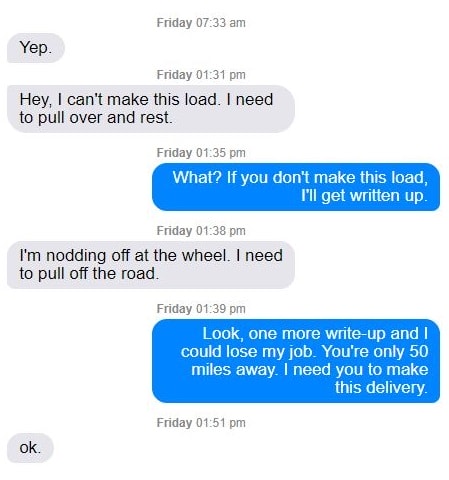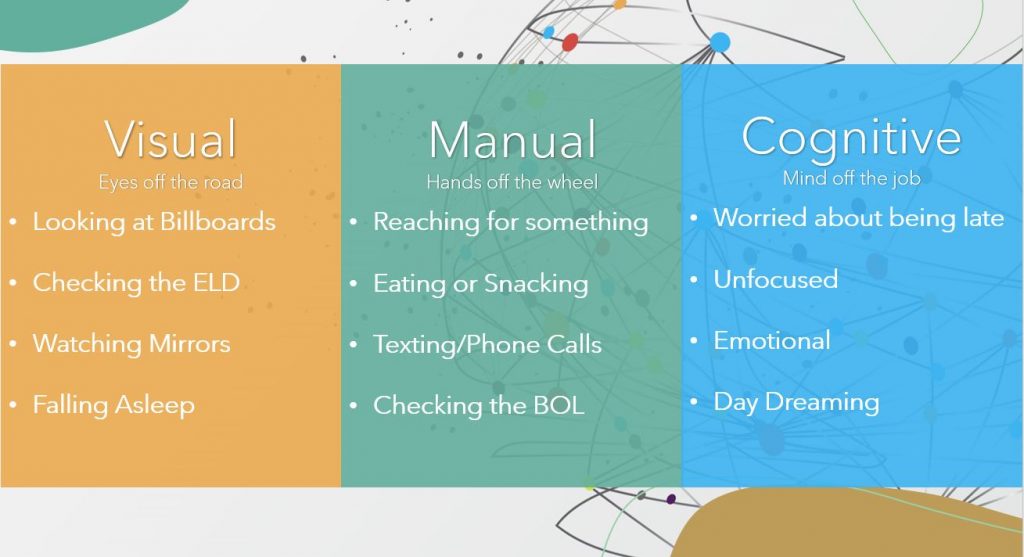Top 5 Surprising Ways Lawyers Attack Trucking Companies
Every trucking company knows the risk involved with hauling an 80,000 lb. machine down the highway. Don’t feel hindered, however, by the mountain of liabilities. Simply be prepared. Below are the weaknesses that prosecuting attorneys will try to take advantage of in the event of an accident.
Driver Fatigue
Every decent truck driver knows to pull it over when they are feeling tired. They know the risks of driving while fatigued. But how often do they actually pull over when they should?
Truckers juggle many pressures while on the road: Traffic congestion, highway construction, dispatcher’s expectations, etc.
Take a look at these messages between a truck driver (grey) and their dispatcher (blue):

A good dispatcher would see the warning signs. The driver didn’t sleep well last night. This dispatcher should have asked about the driver’s ability to safely perform that day. Instead, the dispatcher was concerned with their own performance. Perhaps, feeling the pressure from their own manager. The conversation continues below.

The driver has now admitted to being fatigued, asked to pull over, and coerced into rolling anyway. The driver could nod off again, injuring or even killing themself or other innocent bystanders.
This conversation is now recorded and creates the kind of paper trail that prosecuting attorneys love. They would use this conversation to prove to a jury that your company chose to further the load over the safety of the public.
A delicate balance must exist between management, dispatchers, and truck drivers. Each must be aware of and truly understand mounting pressure and weighing the risks. While is it is a fine goal to want every load delivered on time, it should not be achieved at the expense of safe driving.
Distracted Driving
Distracted driving can take many forms. According to the CDC, distractions are categorized as visual, manual, and cognitive.

Driving an 18-wheeler takes intense focus and coordination. Any of the things listed above could bring about a life or death situation for your driver or the people around them.
Train your fleet not only the signs of distracted driving, but they should also be aware of the potential outcome severity. Visual demonstrations can be assigned fleetwide to prove the importance of maintaining proper attention to the road.
 Let’s say your driver is eating a big, greasy cheeseburger while driving down the highway. After driving over a small pothole, the driver drops a pickle on the tractor seat. The driver leans over to place the burger onto the passenger seat and begins the pickle search.
Let’s say your driver is eating a big, greasy cheeseburger while driving down the highway. After driving over a small pothole, the driver drops a pickle on the tractor seat. The driver leans over to place the burger onto the passenger seat and begins the pickle search.
At the same time, traffic up ahead has abruptly slowed, causing some cars to swerve or pull on the shoulder. When your driver finally finds the pickle and returns their eyes to the road, it is too late. The driver locks up the breaks, jackknifes the trailer, and bumps into 4 cars that were leading the way.
In a scenario where your driver has an accident due to distracted driving, an attorney will look for any reason that it was the company’s fault. In the event of a lawsuit, the prosecuting attorney will consider:
- – What policies do you have in place?
- – Cell phone usage while driving
- – Eating meals/snacks behind the wheel
- – Volume restrictions on the radio
- – Have the drivers been properly trained on these policies?
- – When was the last time a driver was trained/re-trained on this topic?
Driving Under The Influence
Driving under the influence of drugs or alcohol is a crime whether a truck driver or civilian, 18-wheeler or 4-wheeler. Truck drivers, however, hold much more responsibility. The more you communicate with your employees about your drug and alcohol policy, the more likely you are to be protected in court.
Pre/Post-Trip Inspections
A proper pre-trip inspection is the ultimate proactive measure a driver can take. If your drivers aren’t properly trained, it might be difficult to spot a faulty brake line, damaged mud flap, or a loose lug nut.

A proper post-trip involves over 50 points of inspection. Expert drivers might be able to recite all the inspection points from memory, but that skill should not be expected. Provide all your drivers with DVIR checklists. Since these are required to be on file for 90 days, you should require your drivers to fill one out every day, for every load, even if it passes inspection.
Inexperience or Improperly Trained
Perhaps the most important base to have covered. Do you drivers know how to avoid accidents? Do you drivers know what to do in the event of an accident?
You probably have policies in place that explicitly instruct drivers what to do if they get into an accident. Our recommendation is to send this policy out to your fleet at least once a quarter. Test them on the material. Require their signature. Your attorney will easily establish your credibility if you have these documents available.
Review the Webinar
Infinit-I Workforce Solutions presented an exclusive webinar in late July featuring Attorney Peyton Inge. Peyton specializes in defending trucking companies after an accident occurs. You can review the past webinars as well as the rest of the FastForward series.
Get your free training management demo. Infinit-I Workforce Solutions will protect you in a courtroom. Give us 30 minutes to show you how.












